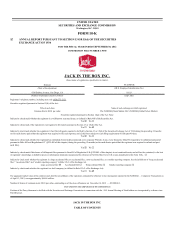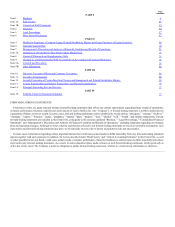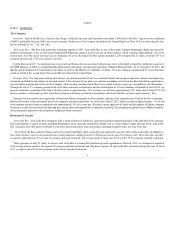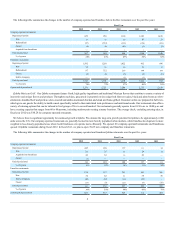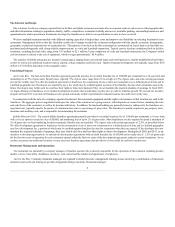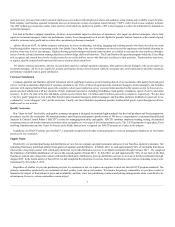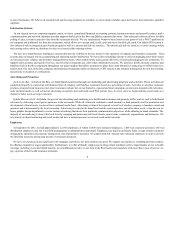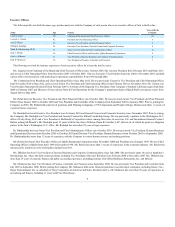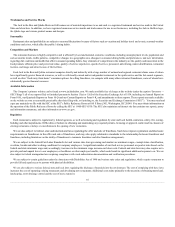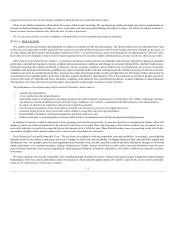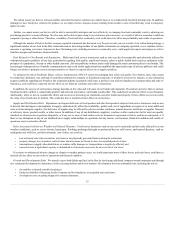Jack In The Box 2012 Annual Report Download - page 9
Download and view the complete annual report
Please find page 9 of the 2012 Jack In The Box annual report below. You can navigate through the pages in the report by either clicking on the pages listed below, or by using the keyword search tool below to find specific information within the annual report.
The Jack in the Box and Qdoba Mexican Grill names are of material importance to us and each is a registered trademark and service mark in the United
State and elsewhere. In addition, we have registered numerous service marks and trade names for use in our businesses, including the Jack in the Box logo,
the Qdoba logo and various product names and designs.
Restaurant sales and profitability are subject to seasonal fluctuations because of factors such as vacation and holiday travel and events, seasonal weather
conditions and crises, which affect the public’s dining habits.
The restaurant business is highly competitive and is affected by local and national economic conditions, including unemployment levels, population and
socioeconomic trends, traffic patterns, competitive changes in a geographic area, changes in consumer dining habits and preferences, and new information
regarding diet, nutrition and health that affect consumer spending habits. Key elements of competition in the industry are the quality and innovation in the
food products offered, price and perceived value, quality of service experience, speed of service, personnel, advertising, name identification, restaurant
location, and image and attractiveness of the facilities.
Each Jack in the Box and Qdoba restaurant competes directly and indirectly with a large number of national and regional restaurant chains some of whom
have significantly greater financial resources, as well as with locally-owned and/or independent restaurants in the quick-service and the fast-casual segments,
as well as other “food away from home” consumer options. In selling franchises, we compete with many other restaurant franchisors, some of whom have
substantially greater financial resources.
The Company’s primary website can be found at www.jackinthebox.com. We make available free of charge at this website (under the caption “Investors —
SEC Filings”) all of our reports filed or furnished pursuant to Section 13(a) or 15(d) of the Securities Exchange Act of 1934, including our Annual Report on
Form 10-K, our Quarterly Reports on Form 10-Q and our Current Reports on Form 8-K, and amendments to those reports. These reports are made available
on the website as soon as reasonably practicable after their filing with, or furnishing to, the Securities and Exchange Commission (“SEC”). You may read and
copy any materials we file with the SEC at the SEC’s Public Reference Room at 100 F Street, NE, Washington, DC 20549. You may obtain information on
the operation of the Public Reference Room by calling the SEC at 1-800-SEC-0330. The SEC also maintains an Internet site that contains our reports, proxy
and information statements, and other information at www.sec.gov.
Each restaurant is subject to regulation by federal agencies, as well as licensing and regulation by state and local health, sanitation, safety, fire, zoning,
building and other departments. Difficulties or failures in obtaining and maintaining any required permits, licensing or approval could result in closures of
existing restaurants or delays or cancellations in the opening of new restaurants.
We are also subject to federal, state and international laws regulating the offer and sale of franchises. Such laws impose registration and disclosure
requirements on franchisors in the offer and sale of franchises, and may also apply substantive standards to the relationship between franchisor and
franchisee, including limitations on the ability of franchisors to terminate franchises and alter franchise arrangements.
We are subject to the federal Fair Labor Standards Act and various state laws governing such matters as minimum wages, exempt status classification,
overtime, breaks and other working conditions for company employees. A significant number of our food service personnel are paid at rates based on the
federal and state minimum wage and, accordingly, increases in the minimum wage increase our labor costs. Federal and state laws may also require us to
provide paid and unpaid leave to our employees, or healthcare or other employee benefits, which could result in significant additional expense to us. We are
also subject to federal immigration laws requiring compliance with work authorization documentation and verification procedures.
We are subject to certain guidelines under the Americans with Disabilities Act of 1990 and various state codes and regulations, which require restaurants to
provide full and equal access to persons with physical disabilities.
We are also subject to various federal, state and local laws regulating the discharge of materials into the environment. The cost of complying with these laws
increases the cost of operating existing restaurants and developing new restaurants. Additional costs relate primarily to the necessity of obtaining more land,
landscaping, storm drainage control and the cost of more expensive
10

